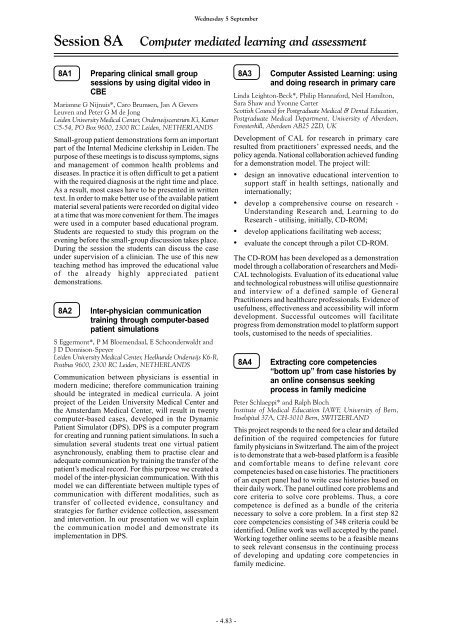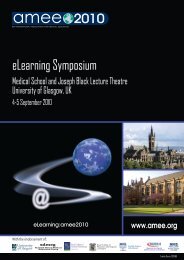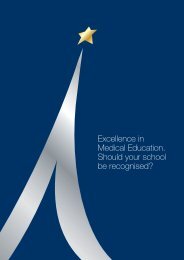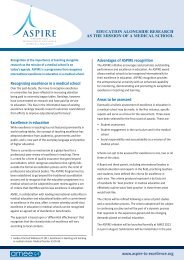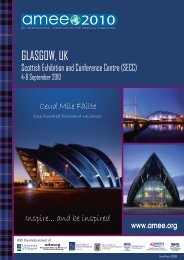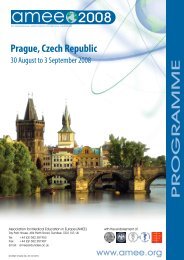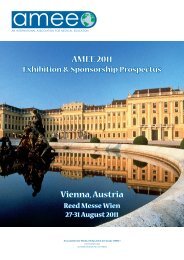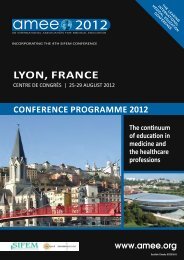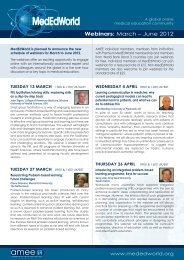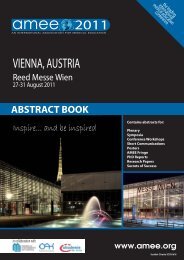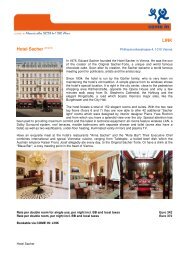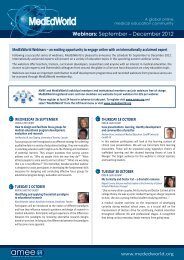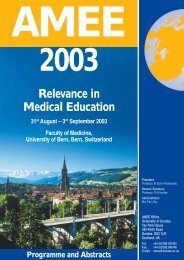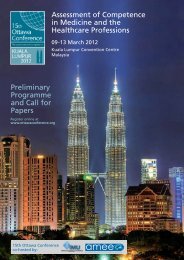AMEE Berlin 2002 Programme
AMEE Berlin 2002 Programme
AMEE Berlin 2002 Programme
You also want an ePaper? Increase the reach of your titles
YUMPU automatically turns print PDFs into web optimized ePapers that Google loves.
Session 8A Computer mediated learning and assessment<br />
8A1 Preparing clinical small group<br />
sessions by using digital video in<br />
CBE<br />
Marianne G Nijnuis*, Caro Brumsen, Jan A Gevers<br />
Leuven and Peter G M de Jong<br />
Leiden University Medical Center, Onderwijscentrum IG, Kamer<br />
C5-54, PO Box 9600, 2300 RC Leiden, NETHERLANDS<br />
Small-group patient demonstrations form an important<br />
part of the Internal Medicine clerkship in Leiden. The<br />
purpose of these meetings is to discuss symptoms, signs<br />
and management of common health problems and<br />
diseases. In practice it is often difficult to get a patient<br />
with the required diagnosis at the right time and place.<br />
As a result, most cases have to be presented in written<br />
text. In order to make better use of the available patient<br />
material several patients were recorded on digital video<br />
at a time that was more convenient for them. The images<br />
were used in a computer based educational program.<br />
Students are requested to study this program on the<br />
evening before the small-group discussion takes place.<br />
During the session the students can discuss the case<br />
under supervision of a clinician. The use of this new<br />
teaching method has improved the educational value<br />
of the already highly appreciated patient<br />
demonstrations.<br />
8A2 Inter-physician communication<br />
training through computer-based<br />
patient simulations<br />
S Eggermont*, P M Bloemendaal, E Schoonderwaldt and<br />
J D Donnison-Speyer<br />
Leiden University Medical Center, Heelkunde Onderwijs K6-R,<br />
Postbus 9600, 2300 RC Leiden, NETHERLANDS<br />
Communication between physicians is essential in<br />
modern medicine; therefore communication training<br />
should be integrated in medical curricula. A joint<br />
project of the Leiden University Medical Center and<br />
the Amsterdam Medical Center, will result in twenty<br />
computer-based cases, developed in the Dynamic<br />
Patient Simulator (DPS). DPS is a computer program<br />
for creating and running patient simulations. In such a<br />
simulation several students treat one virtual patient<br />
asynchronously, enabling them to practise clear and<br />
adequate communication by training the transfer of the<br />
patient’s medical record. For this purpose we created a<br />
model of the inter-physician communication. With this<br />
model we can differentiate between multiple types of<br />
communication with different modalities, such as<br />
transfer of collected evidence, consultancy and<br />
strategies for further evidence collection, assessment<br />
and intervention. In our presentation we will explain<br />
the communication model and demonstrate its<br />
implementation in DPS.<br />
Wednesday 5 September<br />
- 4.83 -<br />
8A3 Computer Assisted Learning: using<br />
and doing research in primary care<br />
Linda Leighton-Beck*, Philip Hannaford, Neil Hamilton,<br />
Sara Shaw and Yvonne Carter<br />
Scottish Council for Postgraduate Medical & Dental Education,<br />
Postgraduate Medical Department, University of Aberdeen,<br />
Foresterhill, Aberdeen AB25 2ZD, UK<br />
Development of CAL for research in primary care<br />
resulted from practitioners’ expressed needs, and the<br />
policy agenda. National collaboration achieved funding<br />
for a demonstration model. The project will:<br />
• design an innovative educational intervention to<br />
support staff in health settings, nationally and<br />
internationally;<br />
• develop a comprehensive course on research -<br />
Understanding Research and, Learning to do<br />
Research - utilising, initially, CD-ROM;<br />
• develop applications facilitating web access;<br />
• evaluate the concept through a pilot CD-ROM.<br />
The CD-ROM has been developed as a demonstration<br />
model through a collaboration of researchers and Medi-<br />
CAL technologists. Evaluation of its educational value<br />
and technological robustness will utilise questionnaire<br />
and interview of a defined sample of General<br />
Practitioners and healthcare professionals. Evidence of<br />
usefulness, effectiveness and accessibility will inform<br />
development. Successful outcomes will facilitate<br />
progress from demonstration model to platform support<br />
tools, customised to the needs of specialities.<br />
8A4 Extracting core competencies<br />
“bottom up” from case histories by<br />
an online consensus seeking<br />
process in family medicine<br />
Peter Schlaeppi* and Ralph Bloch<br />
Institute of Medical Education IAWF, University of Bern,<br />
Inselspital 37A, CH-3010 Bern, SWITZERLAND<br />
This project responds to the need for a clear and detailed<br />
definition of the required competencies for future<br />
family physicians in Switzerland. The aim of the project<br />
is to demonstrate that a web-based platform is a feasible<br />
and comfortable means to define relevant core<br />
competencies based on case histories. The practitioners<br />
of an expert panel had to write case histories based on<br />
their daily work. The panel outlined core problems and<br />
core criteria to solve core problems. Thus, a core<br />
competence is defined as a bundle of the criteria<br />
necessary to solve a core problem. In a first step 82<br />
core competencies consisting of 348 criteria could be<br />
identified. Online work was well accepted by the panel.<br />
Working together online seems to be a feasible means<br />
to seek relevant consensus in the continuing process<br />
of developing and updating core competencies in<br />
family medicine.


